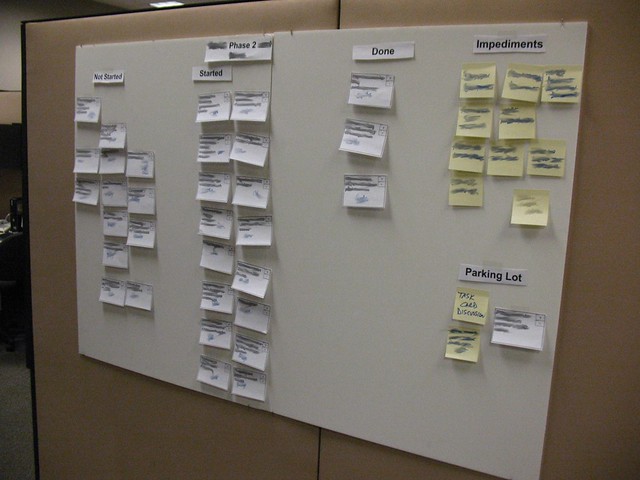I’ve been struggling recently with my to do list. I’ve tried GTD, and recently I discovered Leo Babauta’s essays on a modified approach to GTD. I much prefer this more laid back, simplistic approach to task list management. However, I’ve been struggling to knock items off my to do list.
One of the main reasons for this, I believe, is the quality of the item on my to do list. Some items are simply too generic and too big to get done in one day. By the time I’ve got through the day and struggled to knock off one item off my MIT list, let alone three, it’s quite disheartening.
I clearly need to make some changes to my to do list items, so after a bit of research and thinking, here is what I am proposing I do.
Differentiate Between Projects and Actions
My to do list essentially started off as a dumping ground for all the notes that I had collected through the day that needed me to follow up on them. This works quite well and I don’t feel I need to change how I handle that. Scanning down my list at the moment, I have items like:
- Reply to email on panel buckling
- Check initial stress dossier / report
- Verify sandwich panel analysis method
These are all tasks that need completing. However, item 1 is a standalone action. It only has one step to it. Items 2 and 3 are much bigger tasks. The stress dossier is an 800 page report. And the sandwich panel analysis method I know would take about a week’s work.
These items are projects and can be broken down into several steps – e.g. Check chapter 1 of stress dossier. This is a much more manageable task to handle in a day. It could even be broken down further, for example, to “check first 10 pages of dossier”.
Marketing Professors David Gal and Blake McShane looked into the psychology of checking off smaller goals and they found that completing smaller subtasks motivates individuals to complete the final goal.
So, in future, when I am processing my daily notes, which I do at the end of each day, I shall look at the stages needed to complete each project.
 First Task Board by Alan Dayley
First Task Board by Alan Dayley
I should also note down that I will not be putting “big ticket” projects on my to do list. Items such as “Show A350 Leading Edge To Be Structurally Sound” is not an item for my todo list. That belongs ona completely different list, which I will deal with in a later post.
Only Actions Make it to my Most Important Task List
So, now that I have broken down my larger projects into more manageable chunks, it is only my actions that will make it onto my Most Important Task (MIT) list.
Its important that I have MITs that I can focus on straight away, rather than staring at it pondering what the action I need to do to complete it is.
Each Action Should Contain a Verb
A verb is a doing word. Similar to only having actions on my MIT list, by describing what I need to actually do, I can get straight on with the job, without sitting there for 10 minutes pondering what to do. The pondering should be part of my inbox processing job.
It may be at the beginning of the day, whilst I am declaring my MITs for the day, that I do some further processing to tweak my actions – I may have an urgent task that needs completing, but a lot of meetings that day, so I change one of my actions in order to delegate that task. Either way, when I set up my MITs, they need to be rock solid and ready for me just to start doing.
Be Aware of My Time and Energy Quota
And speaking of busy days, I have had a number of days recently where everything has come at once. For instance, the other day I had a podiatrist appointment first thing in the morning, then I was at a client’s offices the rest of the morning, so I lost half of the morning for doing work at my desk.
I’ve also had days when I’ve not slept too great, so my energy levels haven’t been wonderful (particularly with the recent heatwave we’ve had here lately).
I need to be aware of this when setting up the remainder of my day. Pick off the smaller tasks that I know I can fit in. When my energy levels are low, pick off the mundane tasks that I don’t need to think too hard about. Ask myself if I can delegate any of the work.
There are a lot of ways of doing this, such as scheduling it on my calendar, noting down energy levels required for each task, limiting the time required for each action. However, these are all adding complexity to a system that I want to keep as simple as possible.
Summary
I’ve got a few bits to take away there, so I shall start actioning them over the next week or 2 and see how I get on. I shall also have a think about whether I want to do something more formal with managing time and energy levels when deciding my MITs.



